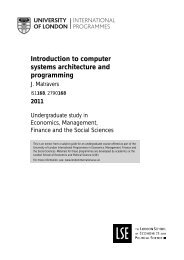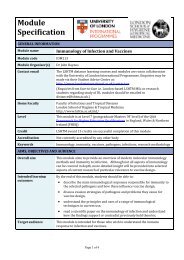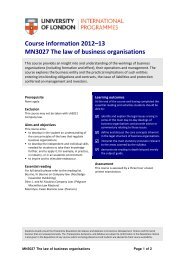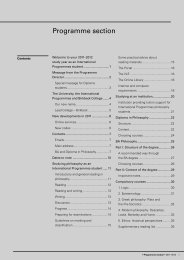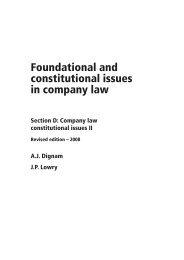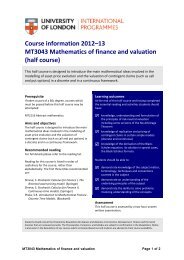Principles of sociology - University of London International ...
Principles of sociology - University of London International ...
Principles of sociology - University of London International ...
Create successful ePaper yourself
Turn your PDF publications into a flip-book with our unique Google optimized e-Paper software.
21 <strong>Principles</strong> <strong>of</strong> <strong>sociology</strong><br />
26<br />
much our ideas <strong>of</strong> what constitutes ‘health and ‘illness’ have changed over<br />
time. In modern societies many things that were simply seen as part <strong>of</strong> life<br />
a century ago – such as pregnancy, long-term unhappiness and disruptive<br />
behaviour by children in school – are now seen as medical conditions<br />
requiring treatments. Sociologists use the term medicalisation to<br />
describe the process whereby more and more aspects <strong>of</strong> life are being<br />
labelled as illnesses. This raises many questions for the sociologist, such<br />
as: why this is happening, how it is happening and whether or not we are<br />
gaining or losing out by being persuaded to see more and more aspects <strong>of</strong><br />
our life as illnesses over which we have no control?<br />
Sociological thinking, then, involves moving to and fro between past,<br />
present and developing ideas that help explain societies, or parts <strong>of</strong><br />
them, as continually changing social processes. Above all, sociologists<br />
are interested in how this changing social order shapes our lives as<br />
individuals. You will be looking at this topic in more detail in Section B on<br />
globalisation.<br />
Summary<br />
Whereas social problems are about things people feel are ‘wrong’<br />
with societies, sociological problems take a much wider focus and ask<br />
how societies work and change in the ways they do. Sociologists are<br />
particularly interested in documenting and explaining social order and the<br />
processes by which this order changes over time.<br />
Further reading<br />
Berger (1963) Chapter 8.<br />
1.6 The individual and society<br />
Commonsense thinking holds that societies are all about individuals.<br />
Many social scientists and scientists would agree with this, arguing that as<br />
societies are clearly created by individuals, it is the study <strong>of</strong> the individual<br />
– through biology, medicine and psychology, for example – that provides<br />
the key to understanding human behaviour.<br />
In questioning this view sociologists are not, as some claim, rejecting the<br />
study <strong>of</strong> the ‘individual’ in favour <strong>of</strong> the ‘group’. Sociologists are interested<br />
in studying individuals, and a lot <strong>of</strong> sociological research involves talking<br />
to and observing individuals. Rather, thinking sociologically involves<br />
seeing the relationship between the individual and society as a two-way,<br />
rather than a one-way, street. As individuals we obviously create societies<br />
but sociologists argue that, in important respects, societies also create us.<br />
How does this happen?<br />
We shall start exploring this process here by asking you to look at your<br />
relationship to society. Maybe there is more <strong>of</strong> society ‘in you’ than you<br />
realise?<br />
You and society: identity and role<br />
What we would like you to do for this section is to think about yourself<br />
and your relationship to the society in which you live. Start by completing<br />
Activity 1.6 below. We will come back to this activity again so it is<br />
important you take a little time to fill it in now.



